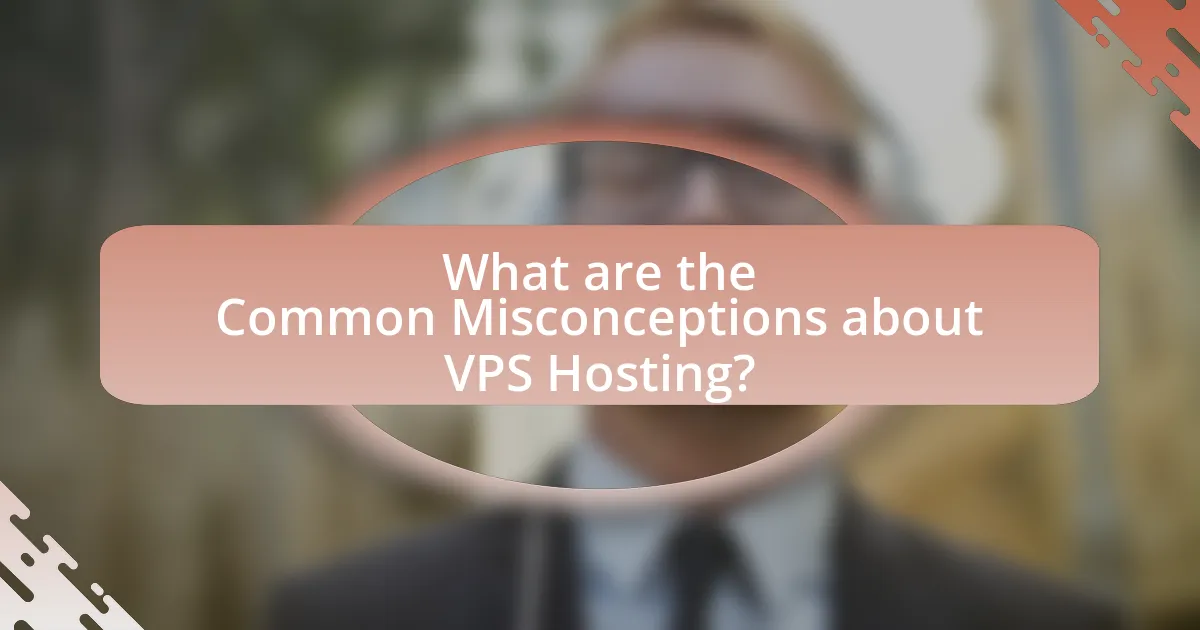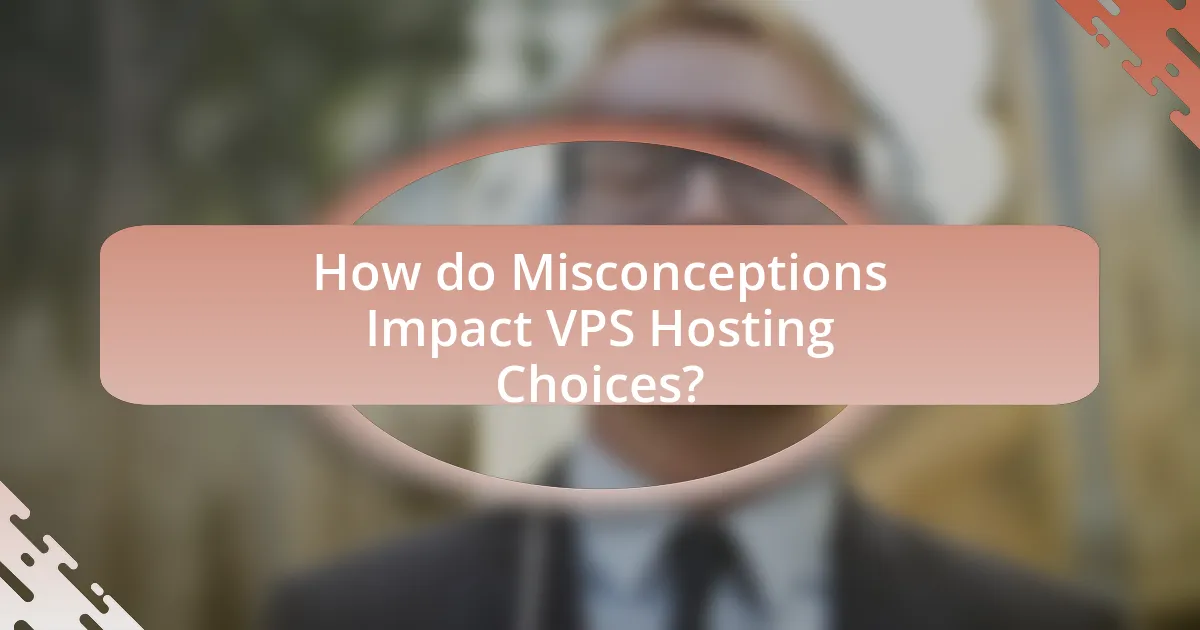VPS hosting, or Virtual Private Server hosting, is often misunderstood due to common misconceptions that equate it with shared hosting, limit its applicability to large businesses, and suggest it requires extensive technical knowledge. This article clarifies these misconceptions by highlighting the dedicated resources, control, and user-friendly management tools that VPS hosting offers, making it accessible for businesses of all sizes. It also discusses the differences between VPS and other hosting types, the impact of these misconceptions on potential users, and practical tips for selecting the right VPS hosting provider. By addressing these points, the article aims to provide a clearer understanding of VPS hosting and its benefits.

What are the Common Misconceptions about VPS Hosting?
Common misconceptions about VPS hosting include the belief that it is the same as shared hosting, that it is only for large businesses, and that it requires extensive technical knowledge to manage. VPS hosting provides dedicated resources and greater control compared to shared hosting, making it suitable for various business sizes, not just large enterprises. Additionally, many VPS providers offer user-friendly management tools and support, reducing the need for advanced technical skills. These clarifications highlight the distinct advantages of VPS hosting and its accessibility for a wider range of users.
Why do people misunderstand VPS Hosting?
People misunderstand VPS hosting primarily due to its technical nature and the terminology used in the industry. Many individuals equate VPS hosting with shared hosting, failing to recognize that VPS provides dedicated resources and greater control over the server environment. This misconception arises because both types of hosting are often marketed to similar audiences, leading to confusion about their distinct functionalities. Additionally, the lack of clear explanations and comparisons in promotional materials contributes to misunderstandings. For instance, a survey by HostingAdvice found that 60% of users could not differentiate between shared and VPS hosting, highlighting the need for better education on the subject.
What are the most prevalent myths surrounding VPS Hosting?
The most prevalent myths surrounding VPS hosting include the beliefs that it is only suitable for large businesses, that it guarantees complete security, and that it is overly complicated to manage. Many individuals assume VPS hosting is exclusively for enterprises due to its higher cost compared to shared hosting; however, VPS is also accessible for small to medium-sized businesses seeking better performance and control. Additionally, while VPS hosting offers enhanced security features compared to shared hosting, it does not guarantee total security, as vulnerabilities can still exist if not properly managed. Lastly, the misconception that VPS management requires extensive technical knowledge is misleading; many hosting providers offer user-friendly interfaces and support, making it manageable for users with varying levels of expertise.
How do these misconceptions affect potential users?
Misconceptions about VPS hosting can lead potential users to underestimate its benefits and overestimate its complexities. For instance, many individuals believe that VPS hosting is only suitable for large businesses, which can deter small businesses and startups from utilizing a scalable and cost-effective solution. This misunderstanding can result in missed opportunities for enhanced performance and flexibility, as VPS hosting offers dedicated resources that can significantly improve website speed and reliability. Additionally, the belief that VPS management requires extensive technical knowledge can discourage users from exploring this option, despite many providers offering user-friendly interfaces and support services. Consequently, these misconceptions can limit the adoption of VPS hosting, preventing users from leveraging its advantages for growth and efficiency.
What are the differences between VPS Hosting and other hosting types?
VPS hosting differs from other hosting types primarily in resource allocation and control. Unlike shared hosting, where multiple users share the same server resources, VPS hosting provides dedicated resources to each virtual server, ensuring better performance and stability. In contrast to dedicated hosting, which offers an entire physical server to a single user, VPS hosting allows multiple users to operate on a single server while maintaining isolated environments. This setup offers a balance between cost and performance, as VPS hosting is typically more affordable than dedicated hosting while providing more control and customization than shared hosting. The isolation in VPS environments enhances security and allows for tailored configurations, which is not possible in shared hosting scenarios.
How does VPS Hosting compare to Shared Hosting?
VPS hosting provides dedicated resources and greater control compared to shared hosting, where multiple users share the same server resources. In VPS hosting, users have their own virtual server environment, allowing for better performance, security, and customization options. For instance, VPS hosting typically offers guaranteed RAM and CPU resources, which can lead to faster load times and improved website performance, while shared hosting can suffer from slowdowns due to resource contention among users. Additionally, VPS hosting allows for root access, enabling users to install custom software and configure their server settings, which is not possible in shared hosting environments.
What sets VPS Hosting apart from Dedicated Hosting?
VPS Hosting differs from Dedicated Hosting primarily in resource allocation and cost. VPS Hosting utilizes virtualization technology to divide a single physical server into multiple virtual servers, allowing users to share resources while maintaining a degree of isolation. In contrast, Dedicated Hosting provides an entire physical server exclusively for one user, offering complete control and maximum performance. This distinction means that VPS Hosting is generally more affordable than Dedicated Hosting, making it a suitable option for businesses that require dedicated resources without the higher costs associated with a full server.

How do Misconceptions Impact VPS Hosting Choices?
Misconceptions significantly impact VPS hosting choices by leading potential users to make uninformed decisions. For instance, many individuals believe that VPS hosting is only suitable for large enterprises, which deters small businesses from leveraging its benefits. This misunderstanding can result in missed opportunities for enhanced performance, scalability, and cost-effectiveness that VPS hosting offers. Additionally, misconceptions about the complexity of managing a VPS can discourage users from choosing this option, despite the availability of user-friendly management tools and support services. According to a survey by HostingAdvice, 60% of small business owners reported avoiding VPS hosting due to these misconceptions, highlighting the need for accurate information to guide their choices.
What are the consequences of believing these misconceptions?
Believing misconceptions about VPS hosting can lead to poor decision-making and financial loss. For instance, the belief that VPS hosting is the same as shared hosting may result in choosing a plan that lacks the necessary resources and performance, ultimately affecting website speed and reliability. Additionally, misconceptions about security can lead to inadequate protection measures, increasing vulnerability to cyberattacks. According to a study by Cybersecurity Ventures, global cybercrime damages are projected to reach $10.5 trillion annually by 2025, highlighting the importance of proper security in hosting choices. Misunderstanding the scalability of VPS can also hinder business growth, as companies may fail to invest in a solution that can adapt to increasing traffic demands.
How can misconceptions lead to poor hosting decisions?
Misconceptions can lead to poor hosting decisions by causing individuals or businesses to choose inappropriate hosting solutions that do not meet their specific needs. For instance, the belief that all VPS hosting plans offer the same performance can result in selecting a lower-tier plan that lacks the necessary resources for high-traffic websites. This can lead to slow loading times and downtime, negatively impacting user experience and search engine rankings. Additionally, misconceptions about security features may lead to underestimating the importance of robust security measures, increasing vulnerability to cyberattacks. According to a study by the Ponemon Institute, 60% of small businesses that experience a cyberattack go out of business within six months, highlighting the critical nature of informed hosting decisions.
What are the financial implications of these misunderstandings?
The financial implications of misunderstandings regarding VPS hosting can lead to increased costs and lost revenue opportunities. For instance, businesses may overestimate their resource needs due to misconceptions about performance, resulting in unnecessary spending on higher-tier plans. Additionally, misunderstandings about scalability can cause companies to invest in infrastructure that does not align with their actual growth, leading to wasted capital. According to a study by Gartner, organizations that mismanage their IT resources can incur costs that exceed 30% of their IT budgets. This highlights the importance of accurate understanding in making informed financial decisions related to VPS hosting.
How can users identify and overcome these misconceptions?
Users can identify and overcome misconceptions about VPS hosting by conducting thorough research and seeking credible sources of information. By comparing VPS hosting features, performance metrics, and user reviews from reputable technology websites, users can clarify misunderstandings. For instance, a study by HostingAdvice found that 70% of users were unaware of the scalability benefits of VPS compared to shared hosting, highlighting a common misconception. Engaging with online forums and communities can also provide insights and real-world experiences that dispel myths, allowing users to make informed decisions based on factual data rather than assumptions.
What resources are available to educate users about VPS Hosting?
Various resources are available to educate users about VPS Hosting, including online tutorials, forums, and documentation from hosting providers. Websites like DigitalOcean and Linode offer comprehensive guides and tutorials that cover the basics of VPS setup and management. Additionally, community forums such as Stack Overflow and Reddit provide platforms for users to ask questions and share experiences. Official documentation from VPS providers often includes detailed information on features, configurations, and troubleshooting, making it a valuable resource for users seeking to understand VPS Hosting better.
How can users verify the accuracy of VPS Hosting information?
Users can verify the accuracy of VPS Hosting information by cross-referencing multiple reputable sources, such as industry-leading websites, user reviews, and technical documentation. This approach ensures that the information is consistent and reliable, as discrepancies among sources can indicate misinformation. For instance, comparing VPS specifications and performance benchmarks from well-known hosting providers like DigitalOcean, Linode, and AWS can help users identify accurate data. Additionally, consulting forums and communities, such as Reddit or specialized tech forums, allows users to gather firsthand experiences and insights from other VPS users, further validating the information.

What are the Realities of VPS Hosting?
VPS hosting provides a virtualized server environment that offers dedicated resources, unlike shared hosting. Users experience improved performance, greater control, and enhanced security, as each VPS operates independently with its own operating system and allocated resources. According to a study by HostingAdvice, VPS hosting can handle higher traffic volumes and allows for custom software installations, making it suitable for growing businesses. Additionally, VPS hosting typically includes root access, enabling users to configure their server settings according to specific needs, which is a significant advantage over shared hosting solutions.
What are the actual benefits of VPS Hosting?
VPS hosting provides several key benefits, including enhanced performance, increased control, and improved security. Enhanced performance is achieved through dedicated resources, allowing websites to handle higher traffic without slowdowns. Increased control comes from root access, enabling users to customize their server environment according to specific needs. Improved security is a result of isolated environments, which protect against vulnerabilities that can affect shared hosting. These benefits make VPS hosting a preferred choice for businesses seeking reliability and scalability.
How does VPS Hosting enhance performance and reliability?
VPS hosting enhances performance and reliability by providing dedicated resources to each virtual server, which minimizes the impact of resource contention. Unlike shared hosting, where multiple users compete for the same resources, VPS hosting allocates specific amounts of CPU, RAM, and storage to each user, ensuring consistent performance. This dedicated environment leads to faster load times and improved application responsiveness. Additionally, VPS hosting often includes features like automated backups and redundancy, which further enhance reliability by protecting data and ensuring uptime. Studies show that websites on VPS can experience up to 30% faster load times compared to those on shared hosting, demonstrating the tangible benefits of VPS in both performance and reliability.
What level of control does VPS Hosting provide to users?
VPS Hosting provides users with a high level of control over their virtual server environment. Users can configure their server settings, install software, and manage security protocols independently, similar to having a dedicated server. This control is facilitated by root access, allowing users to customize their server according to specific needs, which is a significant advantage over shared hosting. The ability to allocate resources, such as CPU and RAM, further enhances user control, enabling tailored performance for applications and websites.
What are common features of VPS Hosting that dispel myths?
Common features of VPS Hosting that dispel myths include dedicated resources, root access, and scalability. Dedicated resources ensure that users have guaranteed CPU, RAM, and storage, which counters the myth that VPS is just shared hosting in disguise. Root access allows users to install and configure software as needed, debunking the misconception that VPS lacks control compared to dedicated servers. Scalability features enable users to easily upgrade resources as their needs grow, disproving the belief that VPS is inflexible. These characteristics highlight the distinct advantages of VPS Hosting over other hosting types.
How does scalability work in VPS Hosting?
Scalability in VPS hosting allows users to adjust their resources, such as CPU, RAM, and storage, based on their needs. This flexibility is achieved through virtualization technology, which enables multiple virtual servers to run on a single physical server, allowing for easy resource allocation. For instance, if a website experiences increased traffic, users can quickly upgrade their VPS plan to accommodate the higher demand without significant downtime. This capability is supported by the underlying infrastructure of VPS providers, which often includes automated systems for resource management and scaling.
What security measures are typically included in VPS Hosting plans?
VPS hosting plans typically include security measures such as firewalls, DDoS protection, regular backups, and operating system updates. Firewalls help to filter incoming and outgoing traffic, protecting against unauthorized access. DDoS protection mitigates the risk of distributed denial-of-service attacks, ensuring service availability. Regular backups safeguard data against loss, while operating system updates patch vulnerabilities, enhancing overall security. These measures collectively contribute to a secure hosting environment, addressing common security concerns associated with VPS hosting.
What practical tips can help users choose the right VPS Hosting?
To choose the right VPS hosting, users should evaluate their specific needs, including resource requirements, budget, and technical expertise. Assessing the amount of CPU, RAM, and storage needed for applications ensures optimal performance. Users should also compare pricing plans and features across different providers, as costs can vary significantly; for instance, a study by HostingAdvice found that VPS prices can range from $5 to $100 per month based on specifications. Additionally, checking for customer support options and uptime guarantees is crucial, as reliable support can mitigate issues quickly, with many reputable providers offering at least 99.9% uptime. Finally, reading user reviews and testimonials can provide insights into the reliability and performance of the hosting service, helping users make an informed decision.
How should users assess their specific needs for VPS Hosting?
Users should assess their specific needs for VPS hosting by evaluating their website traffic, resource requirements, and technical expertise. Understanding the expected traffic helps determine the necessary bandwidth and server capacity, while identifying resource needs, such as CPU, RAM, and storage, ensures optimal performance. Additionally, users should consider their technical skills; those with limited experience may require managed VPS solutions, whereas more experienced users might prefer unmanaged options for greater control. This assessment allows users to select a VPS plan that aligns with their operational demands and budget constraints.
What are the best practices for selecting a VPS Hosting provider?
The best practices for selecting a VPS hosting provider include evaluating performance, reliability, customer support, and pricing. Performance is crucial; choose a provider with high uptime guarantees, ideally above 99.9%, to ensure your website remains accessible. Reliability can be assessed through customer reviews and industry reputation, as providers with a solid track record are more likely to deliver consistent service. Customer support should be available 24/7 via multiple channels, such as live chat, phone, and email, to address issues promptly. Pricing should be transparent, with no hidden fees, and should align with the features offered, ensuring you receive good value for your investment. These practices are validated by industry standards and user experiences, emphasizing the importance of thorough research before making a decision.


